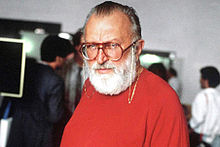Sergio Leone
Sergio Leone (Rome, January 3, 1929 - Rome, April 30, 1989) was an Italian screenwriter, producer and film director known for his spaghetti westerns.
Biography
Son of film director Roberto Roberti (pseudonym Vincenzo Leone) and silent film actress Bice Waleran (Edvige Valcarenghi).
Early Years
Still very young, he entered the film industry and at twenty was an assistant director in the film Ladri di biciclette (1948) by Vittorio de Sica. He would later work in major American productions shot in Europe, including Mervyn LeRoy's Quo Vadis? (1951), Robert Wise's Helen of Troy (1955), Ben -Hur (1959) by William Wyler or A Nun's Story (1959) by Fred Zinnemann.
He also replaced director Mario Bonnard due to illness during the filming of The Last Days of Pompeii (1959). His first official film was The Colossus of Rhodes (1960) and two years later he would again replace a director, Robert Aldrich, in Sodom and Gomorrah . Aldrich was a key influence for Leone, with films like Vera Cruz (1954), where the classic profile of the western fades with more ambiguous characters lacking values.
Heyday
From here his most personal works begin, beginning with the famous western trilogy, also known as the Dollar Trilogy, in co-production with various European countries. The trilogy achieved an unexpected great success, leading the western to its last cinematographic period, the so-called spaghetti western, a genre widely cultivated in the cinema of the 1960s and early 1960s. 70, in addition to bringing two new talents to the medium, the composer Ennio Morricone, a childhood friend of the director, and the actor Clint Eastwood, practically unknown on the big screen until then, whom the director recruits from among a group of actors, which also included an icon of the subgenre, Lee van Cleef.
The character created for Eastwood, The Man with No Name, is the prototype of the antihero of the spaghetti western, a cold, hard, lonely man, with few words, moved for the money, without scruples or feelings. In this way, Leone created an icon of the cinema, imperturbable and with an icy gaze, invincible in multiple duels. Always dressed in a threadbare poncho and a cigar on his lips, he is capable of killing in cold blood to achieve his goal. He is a character that will become a stereotype in multiple films and will decisively influence directors, actors and even cartoonists. It should be noted that For a Fistful of Dollars he got into some legal trouble for plagiarizing an earlier film by Akira Kurosawa titled Yojimbo (1961).
After this trilogy he did not abandon the theme of the western and filmed one of his masterpieces, C'era una volta il West, a western crepuscular filmed in Cinecittà, Almería, La Calahorra, near Guadix (Granada) and on the same American locations where his admired John Ford shot most of his films.
After a longer period, he returned to the cinema, almost by obligation, with Giù la testa, based on the Mexican Revolution, which was less successful than his previous films. She directed this film at the last moment due to problems with the director chosen in the first place. Ultimately, he directed what many consider his masterpiece, Once Upon a Time in America, a "modern" western ; which is about the life of four Jewish gangsters in New York in the 1920s and 30s. In Europe it was very successful despite being four hours long, but in the US a version cut to almost two hours was offered, in addition to altering its editing (the story was told linearly and not as in the original in which flashbacks are used).
The critic Ramón Freixas defined him as "a moralist without morals, a feminist misogynist, and a pacifist with gunshots". Sergio always had a childhood friend by his side, who made his films even greater, the composer Ennio Morricone .
Death
Sergio Leone died in 1989, when he was preparing the film Leningrad, due to heart problems he had suffered since he entered into lawsuits with Warner Bros. for the film Once upon a time in America. The production company cut the film by more than an hour and hired the editor in charge of Police Academy, Zach Staenberg, for this task.
Filmography
- Films as director
- The Colossus of Rhodes (1961)
- For a handful of dollars (1964)
- Per qualche dollaro in più (1965)
- Il buono, il brutto, il cattivo (1966)
- C'era una volta il West (1968)
- Giù the testa (1971)
- Once in America (1984)
- Documentaries
- Sergio Leone: The Way I See Things (2006)
- Sergio Leone - L'italiano che inventò l'America (2022)
Awards
Golden Globes
| Year | Category | Movie | Outcome |
|---|---|---|---|
| 1984 | Best director | Once in America | Nominee |
BAFTA
| Year | Category | Movie | Outcome |
|---|---|---|---|
| 1984 | Best director | Once in America | Nominee |
David by Donatello
| Year | Category | Movie | Outcome |
|---|---|---|---|
| 1972 | Best director | Giù the testa | Winner |
Contenido relacionado
Nicolas LeBlanc
The Butcher's Wife
Down Periscope
